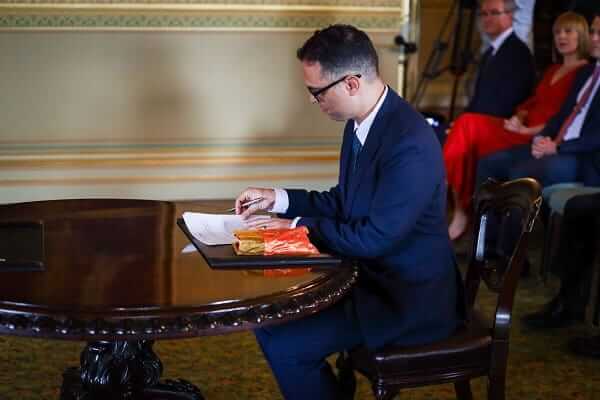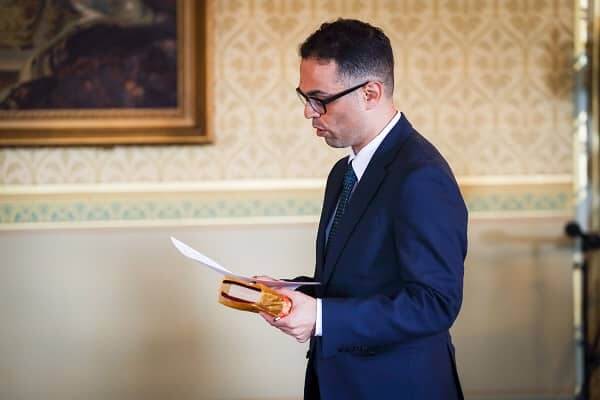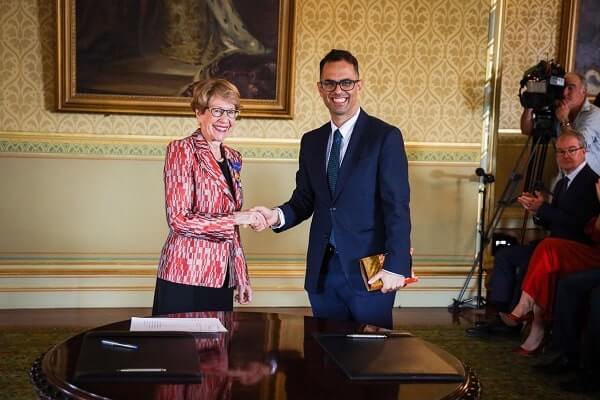“I am incredibly honoured and humbled to be the first Australian Minister, state or federally, to take my oath of allegiance on the Bhagavad Gita,” NSW Treasurer and Minister for the Gig Economy Daniel Mookhey said after the swearing in of the Chris Minns Government on 28 March.
Treasurer Mookhey, the son of Indian migrants from Punjab, has been a member of the NSW Legislative Council since 2015 and was previously the first Australian of Indian-origin politician to enter the NSW Parliament.
He speaks here about the responsibilities in his new role as the Treasurer, his Indian heritage, and about NSW’s ties with India.
Daniel Mookhey, congratulations on the new job. How are you feeling?
I’m feeling overwhelmed – excited and thrilled that we had the opportunity to change the government and change the direction of the State. It’s just such a thrill to be a part of it.
As the incoming treasurer for the NSW government, what kind of economy are you inheriting from the previous Liberal government?
Look, it’s troubled. Inflation is high, economic growth is obviously challenging right now. A lot of uncertainty in global markets. At the same time, the NSW government has inherited quite a lot of debt, quite a lot of challenges to do with the budget. So I’m just purposeful in terms of the work that I want to go about doing as Treasurer. I’m pretty determined to deliver all the commitments we made that got us elected – especially about rebuilding our schools and our hospitals and bringing an end to privatisation.

You’ve touched on a few of those things there in terms of pressures – we have inflation, we’ve got rising interest rates, rising costs of living, a housing crisis as well for renters in particular. In terms of that vision that you’ve talked about, what are your priorities as Treasurer? And what are the key challenges that you think you’re going to face as Treasurer in meeting those challenges?
My priority as Treasurer is to make sure that every school has the resources they need to be able to give every kid the opportunity for the best education that is possible, because education has transformed my life and education transforms so many lives. My job is to make sure that anyone who turns up to a hospital in NSW can see a doctor, a nurse, a paramedic and get the help that they need as well. So I think of my job as Treasurer not as much about what the finances are – the finance of course is crucial – but actually why we manage to budget well to be able to make sure that people have the services that they’ve been promised that they can rely on.
Are there any things that the NSW government can do in terms of those cost-of-living pressures?
Yep, we can cap tolls to $60 per week for two years, as we promised. We can bring an end to privatisation which is the reason why so many families are having to pay super profits to privately owned electricity companies. We can begin the hard work of managing the budget well, so we’re taking pressure off inflation, working in partnership with Anthony Albanese and his government, as well as the Reserve Bank.
You’re evidently a leader as well that’s really proud of their Indian heritage. On the Australia-India front, do you think NSW gives enough importance to its trade relationship with India?
I think Australia is paying a lot more attention to India and India is paying a lot more attention to Australia, and that is to our mutual benefit. And I think that the Australian-Indian communities are transforming Australia – the diaspora is our best asset when it comes to engaging with India and so much of the links, the people-to-people links between Australia and India, are much ahead of where perhaps the government should have been right now. I think it’s terrific that Anthony Albanese has made these relationships such a priority for him. I think it’s also excellent that the Indian government is reciprocating, and we look forward to welcoming Prime Minister Modi to the country soon.
When you say that the Australia-India relationship could have been further ahead, or perhaps something on which we could have moved on sooner, what can the NSW government do to improve the trade relationship? More broadly, what’s the vision for your government in this space?
The trade relationship with India in NSW is being led by the NSW diaspora. Every time I meet with Australians of Indian origin now, it is so remarkable how complex those links are. I’d really like to see the NSW government put it centre of its strategy when it comes to engaging with India – the links that the diaspora has already forged, as well as the further growth that is possible if we actually have the NSW Indian diaspora leading this conversation on behalf of the state government. Frankly, the diaspora knows more than the government does.
You’ve been making waves recently both in Australia and India on that front, with Indian news media widely reporting your swearing-in ceremony. You’ve become a bit of a domestic and international sensation in that regard by being the first Australian-Indian to take their oath on the Bhagvad Gita. What is the Bhagavad Gita’s significance for Daniel Mookhey? Is there something within it that inspires you, or was it a symbolic choice to recognise the diaspora in the state of NSW?

All of the above. It actually kind of a tribute to my parents, who migrated to Australia back in the early 1970s like so many others, with very little to bring with them from their country other than their faith and their family. So for me, it really is a tribute to my mother and my father, as well as the community which I grew up that was so organised around our Temple. And so I wanted to tip my hat to that heritage, but I also wanted to make it clear, this is what modern Australia and modern NSW look like.
Fantastic. I think that your parents would be very proud, no doubt, and probably a lot of ethnic children, myself included, will get that familiar “you must be like him” lecture.
I apologise for all the children who will now be lectured by their parents.
We’re very happy to see it. In terms of that Indian culture that you’re really proud of, are there any aspects that you particularly celebrate? You were in India recently, in 2020?
Yes, my brother lives in India half the year. I have so much family there. I visit so often and I’m looking forward to taking my children there. My oldest son, I took in 2020 just before COVID, and now my younger son is due to visit for the first time ever, so he can meet his extended family – my mamas and mosas and masis – all of them. I’m really looking forward to that – obviously for me, it is such an important part of who I am as an Australian Indian. I’m at that stage of life where I’m teaching my children what it’s like to live in the two worlds that we do – often as an Australian first, but very proud of the heritage and the culture that we have.
That leads nicely to the final question that I have for you, which is, there are now four people of Indian origin in this next term of NSW Parliament – three Australian-Indians from the ALP, and one from the Nationals. What’s your reaction to seeing that, and what work still needs to be done on that front, to see a more accurate representation of diverse communities in Parliament?
Well, I’m just thrilled that the representation has gone up for all people of different cultural backgrounds. I think it’s so much better that we have a more culturally diverse Parliament. We need a democracy that looks like the people it represents, and I’m personally very pleased that my party has done a lot to make sure that the people we are choosing to run for public office do represent the full diversity of the NSW community. I’m so thrilled for Charishma Kaliyanda who has been elected as the new member for Liverpool. I saw her this morning at our first caucus and to just have her in there is terrific. The deputy Premier and the Treasurer both having Indian heritage in this government, is just such a sign of how as a parliament we are looking like the people we represent. But I’m just as proud that next week we’ll be swearing in a minister of Buddhist origin, we’ll have the first Islamic Minister I think, likely to be sworn in too. And I don’t think we deserve massive pats on the back for this as politicians, because frankly we should have been achieving this already, but I do think we should mark the fact that progress has been made and there’s more progress to be done.
READ ALSO: Daniel Mookhey, the first Australian minister to be sworn in on Bhagavad Gita





